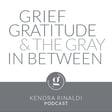
When People Leave: A Conversation on Grief, Family Secrets, and Finding Your Voice with Leslie A. Rasmussen
Leslie A. Rasmussen was born and raised in Los Angeles and graduated from UCLA. She went on to write television comedies for Gerald McRaney, Burt Reynolds, Roseanne Barr, Norm McDonald, Drew Carey, as well as The Wild Thornberrys and Sweet Valley High. After leaving the business to raise her boys, Leslie obtained a master's degree in nutrition and ran her own business for ten years. More recently, Leslie has been published on Huffington Post over twenty times and speaks on panels discussing female empowerment. She’s a member of the Writers Guild of America, as well as Women in Film and the UCLA Alumni Association. After Happily Ever After is Leslie’s debut novel and has won over fifteen awards, and her second novel, The Stories We Cannot Tell, has won eleven awards. Leslie has been interviewed about it on NPR and XM radio. Leslie’s latest novel, When People Leave, was released in May 2025. When Leslie isn’t writing, she enjoys reading, exercising, and spending time with friends. Leslie lives in Southern California with her husband and two sons.Links:
https://www.lesliearasmussen.com
IG: https://www.instagram.com/leslierauthor
Facebook: https://www.facebook.com/lesliearasmussenauthor
Show Themes:
- Grief in Life's Transitions: A heartfelt discussion about how grief isn't limited to death but is a natural part of major life changes, like children leaving for college or moving into new chapters of life.
- Art, Grief, and Humor: Leslie explores how writing can be a powerful tool to process grief and how humor is a vital and natural part of healing, often reflecting a loved one's personality.
- The Power of Perspective: Discover how art takes on a new life when shared, highlighted by a reader who saw one of Leslie's books not just as a story, but as a "love story of a woman falling in love with her life".
- Finding Meaning and Community: Leslie shares her belief that storytelling helps people feel less alone, starts important conversations, and reminds us that everyone is navigating their own struggles.
Contact Kendra Rinaldi to be a guest or for a free discovery call griefgratittudepodcast@gmail.com


